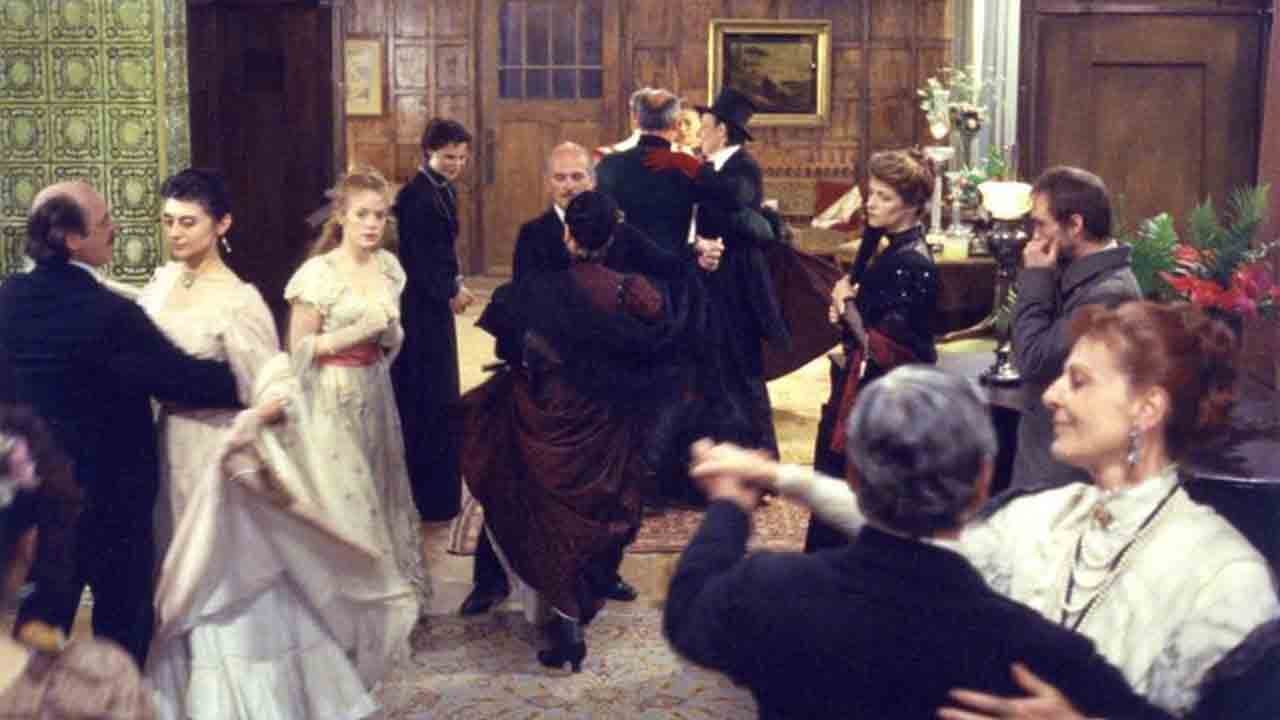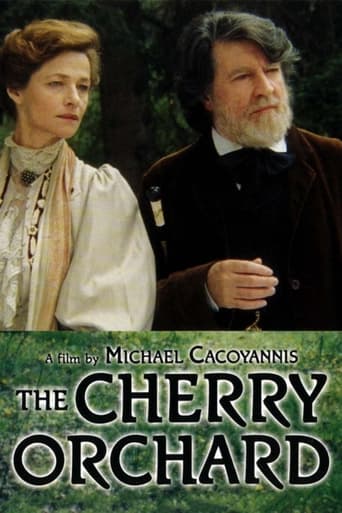



Beautiful, moving film.
Close shines in drama with strong language, adult themes.
View MoreThe film never slows down or bores, plunging from one harrowing sequence to the next.
View MoreThe storyline feels a little thin and moth-eaten in parts but this sequel is plenty of fun.
View MoreI agree with a previous review that this version of THE CHERRY ORCHARD doesn't happen until halfway through. Then, the curtain comes up, the story and the characters gel, the ideas kick in and the play is revealed.This is one of the only performances of Alan Bates that I didn't care for. It seemed silly and forced.Charlotte Rampling is rather perfect, however.I love Chekhov but I expect to be disappointed. I've seen performances on stage and on the screen that horrified all my sensibilities to the depth of my soul. I've seen plenty of train wrecks. This starts off very badly with a prologue that is utterly unnecessary and not very interesting. Scenes are presented in different order and seem to be jumbled up in a unauthentic attempt at cinema.The beginning just doesn't work.But, if you're patient, the second half does have many moments that are satisfying and resonate deeply. We see many of Chekhov's themes of loss, unrequited love, the ennui of modern life, etc. The acting seems more focused and the pay off pretty good by the end.I recommend it with serious reservations in mind.
View MoreI don't know that it's possible to achieve a satisfactory production of this Chekov work. Written at the end of his life, the tone is always a question. When Chekov first saw what Stanislavski had done with the play, he was horrified. "This is a comedy!" Well, that's hard to pull off. While all the characters are certainly silly and vain and foolish, their circumstance--with the weight of the Revolution soon to rip the entire World open--is not anything to laugh at. And their future is undeniably grim, even though we have the perspective of history to assess their fate, in the context of the play, what's ahead is not going to be something where the audience can rejoice. At the premiere, audiences cheered at the sound of the ax cutting the orchard. Whether that was Chekov's intention (doubtful), it's impossible to create that kind of reaction today. Cacoyannis, however, comes close to perfection. While some of the lines are stage-bound, his choice to open the play up to nature as much as possible was the right one. We see the investment in the family has in the orchard first hand and what it means to lose it. The music by Tchaikovsky adds an aura of authenticity to these fragile people and their bittersweet story; set decoration and costuming are both splendid.Ms. Rampling, who is always interesting, works against the classic portrayal of Mme. Ranevsky. She's not simply a ninny who has suffered circumstances that she's unprepared to deal with; Rampling shows us she's suffered real tragedy and to survive has lapsed into a world bordering on delusion. It's a tender and loving performance.The rest of the cast is more traditional but also excellent.The camera shows us it's magic in the final tableaux. As it floats around the abandoned and locked country home, Chekov's most surprising device works better on screen than on the stage.This is a very impressive work by one of the masters of the cinema who has brought one of the masterpieces of theater (again) to audiences of the cinema.Note: I've since read where other viewers objected to the brief prologue Cacoyannis has added to the play, and I'm going to disagree that it was a mistake. In a stage production, the audience is somewhat disoriented as to why Ranevsky is arriving at the estate, and Cacoyannis clarifies that with the prologue. As well, we are allowed some of the poignancy of the return and to see where and with whom she's been spending her time. For me it added rather than distracted to the text.
View MoreMichael Cacoyannis seems strangely reluctant to tell this story in a straightforward, understandable fashion. This ridiculously edited film rates a 7 out of 10 only because it does, in its idiosyncratic way, convey something of the story of a Russian woman, of the landed gentry, fallen on hard times, who is desperately seeking to preserve the ownership of her estate, on which is an ancient and beloved cherry orchard. If she is forced to sell, the orchard will be cut down and the estate "developed" into "affordable housing". So what else is new, eh?By all, this is the choppiest editing and directing style I have ever encountered. Chekhov's play is certainly not constructed this way. There is no effort to introduce characters in an orderly fashion so that one may get to know who they are, and what their relationships and motivations are. Some of this eventually emerges if you are patient and alert enough, but don't blink! Some of the cast work is excellent. They must have been frustrated, though, if they knew what kind of editing would appear in the final cut.
View MoreChekhov's plays have generally resisted film and TV adaptations: Sidney Lumet's "Sea Gull" was lumpy and not well cast, and even the Russian film adaptations have been turgid affairs.Michael Cacoyannis' version of "The Cherry Orchard" (originally titled "Varya" after one of the main characters), is better than Lumet's film largely because it's better acted in general. But the direction is sometimes fussy, sometimes leaden - the pacing becomes more and more turgid as the film progresses. The final 40 minutes or so become very tedious. Plus there's an unnecessary prologue in Paris - an obvious attempt to open up the play, but it goes on much too long.Charlotte Rampling does very well as Madame Ranyevskaya, a near-penniless aristocrat who returns to her family estate as it is about to be auctioned after a default on the mortgage. Rampling clearly shows us a aging woman who is spoiled, charming, childish, delusional, sometimes haughty and condescending, and feckless - a person who never learned how to manage money because she never felt she had to. Her performance makes this woman less conventionally sympathetic than others in the role - which is fine. There are times when her performance is undercut by some jarring editing where her mood swings from one extreme to another.The rest of the cast is quite fine: Alan Bates as Ranyevskaya's equally feckless and lazy brother Gayev shows us the man who knows full well his coming fate, yet goes through fits of denial to coddle his sister and the others; Michael Gough as the increasingly senile family servant Fiers; Tushka Bergen as Ranyevskaya's daughter Anya.The best acting comes from Katrin Cartlidge as the hapless, lovesick, foster daughter Varya, a soul sister to Sonia of Uncle Vanya; and Owen Teale (who was superb with Janet McTeer onstage in "A Doll's House") as Lopahin, a former peasant whose family worked on Ranyevskaya's farm but who has now become a successful businessman. His efforts to convince the fading aristocrats to save themselves by selling the estate fall on deaf ears, so he decides on a different plan of action.I would recommend seeing this only to people who are familiar with the play. First-timers would be better off seeking out a good stage production (lots of luck there) as Chekhov has always worked better there.
View More